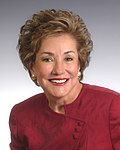| |||||||||||||||||
| |||||||||||||||||
 County results Dole: 40–50% 50–60% 60–70% 70–80% Bowles: 40–50% 50–60% 60–70% 70–80% | |||||||||||||||||
| |||||||||||||||||
| Elections in North Carolina |
|---|
 |
The 2002 United States Senate election in North Carolina was held on November 5, 2002. Incumbent Republican U.S. Senator Jesse Helms announced in August 2001 that he would retire due to health issues. Republican Elizabeth Dole won the open seat, becoming the first non-incumbent elected Republican Senator in the state's history. This was the first open seat election since 1974 and the first time happened at this seat.

